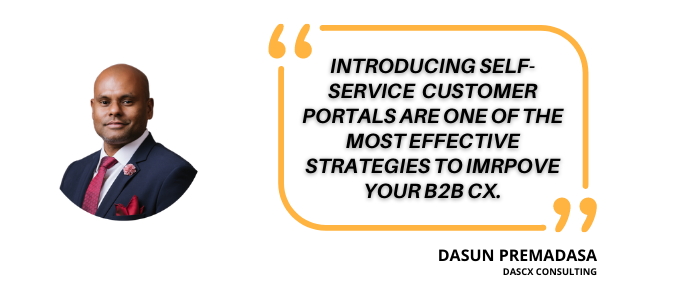The future of property management is being rewritten by the emergence of Artificial Intelligence (AI) agents, marking a departure from traditional practices towards a...
For consumer goods companies, B2B customer experience (CX) is one of those areas that are quite often overlooked when they think about their customer experience strategy, or digital transformation. That is because most companies, by default, look at how to improve their consumer experience more than that of improving the B2B customer experience. If you’re a manufacturing firm, an importer or a distributor, you cannot ignore the importance of your B2B customers. If you will be relying on your old-school ways of dealing with your B2B partners, all they need is another vendor to replace you.
B2B customer experience is very important as it will help you to position yourself as the preferred B2B within the market. That will make it harder for them to replace you as a B2B partner. In this article, I’m going to share 7 strategies to improve your B2B customer experience to become the preferred B2B partner.
1. Giving Access to Financial Information
In the last 10 years, I have been working with quite a few well-known consumer goods companies within Australia. One of the biggest challenges they faced was when their B2B partners request for access to financial information they had to go through a very annoying process to get the requested information to these partners. They did not have any mechanism or system in place to efficiently deliver this information to their partners, they had to manually extract data and email them most of the time.
Having a self-service portal for B2B partners to securely share financial documents such as invoices, purchase orders and other related financial information is the best method to tackle this problem. For some companies we went even further by allowing customers to pay their invoices online through these portals. A lot of organizations these days see the value in having a self-service portal for their B2B partners, so they can provide access to the information around the clock without having to handle large number of customer service requests via phone or email. Also, in our experience B2B customers prefer this method as they can access their information when ever and wherever they need it.

2. Giving Access to Accurate Product Information and Digital Assets
In my experience one of the biggest time wasters for sales and marketing teams team consumer goods companies is responding to product materials and information requests from their B2B partners or customers. Even though product information is one of the most basic items, some companies still have to scramble to get accurate product information whenever someone request them. And if you are a business with hundreds of SKUs, there is a possibility of you making mistakes during this process.
With businesses today promoting their products on multiple channels, it is critical that you have systems in place to share information accurately and quickly. Solutions such as product information management (PIM) and digital asset management (DAM) are gaining popularity today as these solutions are built to solve this problem.
Given there are hundreds of PIM and DAM solutions available within the market today, we highly recommend you doing your homework to find the right solution for your business as not all these systems are the same.
3. Giving Access to B2B Order Statuses
This is another area a lot of consumer goods companies struggle when it comes to B2B channels. When it comes to sharing order statuses to their B2B partners, most of the companies somehow forgot the need to share that information with their B2B customers. This may be due to limitation of the fulfillment house or sometimes maybe due to limitations within your IT infrastructure.
In my experience, B2B customers appreciate having visibility into their orders and their statuses through a self-service portal. According to several customer surveys we ran B2B customers find having order statuses and details through a portal adds more value to them than being able to place orders through an online portal.
4. Introduce Self-Service B2B Customer Portals
With B2B customers continue to look to ways to improve efficiencies within their businesses, they also look for partners provide them with more efficient ways to conduct business. Regardless of the industry, companies moving away from sending emails or giving a call to customer service as that is considered an inefficient way of doing business.
One solution I recommend for businesses is the self-service option. With right approach companies can introduce an additional self-service channel to the current customer support channels to service those B2B customers who prefer self-service option. When executed right, in my experience B2B customer portals are one of the best ways to take your B2B customer experience to the next level. It not only improves customer experience, but also help companies to reduce customer service over head.
Still designing a self-service B2B customer portal is critical to get the best results. What services to deliver through the portal and what services to leave out, most importantly, how portal will work with your existing customer service channels to deliver a great CX.
5. Giving Access to Contract and Commercial Documentation
Lot of consumer goods companies have contracts with their B2B partners, especially retailers. These can be anything from commercial contracts outlining what products they offer, how they want the products to be listed, how they are labelled, how they should be placed on shelves, etc. A lot of these information are most kept in legal systems.
If your get requests to share these information more than 2 or 3 times, I would recommend introducing systems to share this information with your B2B partners. Again, companies with portals use their existing portal as a digital delivery mechanism to share these contracts. Businesses today increasingly adopt digital contracts with digital signatures and most of these systems offer the ability to share documents with relevant parties.
5. Restructure & Retrain Customer Service Teams
A lot of organizations think that by introducing self-service portals, they can get rid of the traditional customer service teams. But regardless of new customer interaction channels you introduce to service your B2B customers, you must continue to improve the capabilities, operational processes of your customer service teams. Even though companies prefer to use self-service portals, there are instances that they still need to contact a human operator to resolve certain issues. So it is still very much important to leave a customer service option alongside a self-service portals.
However the customers service teams must be retrained and processes must be improved and streamlined to work with other additional CX channels to deliver consistent service across all channels. Companies who are CX leaders, ensure that they deliver the same exact great customer service regardless of the channel and every consumer goods company my strive to achieve this.
6. Delivering Consistent Experience Across All Customer Touch Points
One of the keys to deliver great omni channel experience is to ensure that you deliver the same exact experience to your B2B customers as they interact with different channels. In my experience, one of the areas companies ignore is the importance of sharing customer interaction information within internal systems.
With companies continue to operate teams who deals directly with B2B customers (E.g.: Business development managers, Sales Reps, etc.) who are on the field talking to the customers must have access to the same information that is available through your customer portals and other systems. As a business this will allow your to deliver the same experience whether your B2B customer interact with your sales person in person or through a self-service B2B customer portal. It is critical for a consumer goods business to deliver a consistent message across all customer touchpoints.

About Author
Dasun Premadasa is the Founder and CEO of DASCX, the premiere B2B CX consulting firm for manufacturers in Australia. With over two decades of experience including four large CX and digital transformation programs at 4 different manufacturing and automotive firms in Australia, he's one of the best business technology experts for B2B customer experience.
Leave a Reply Cancel reply
Previous Story
7 Trends to Improve E-Commerce in 2022
Next Story
6 Mistakes That Lead to Project Failure
Related Posts
The realm of strata management is undergoing a significant transformation, with Artificial Intelligence (AI) at the helm, steering the industry towards unprecedented efficiency, cost-effectiveness,...
The strata management industry stands on the brink of a new era, propelled into the future by the advent of Artificial Intelligence (AI) automation....



